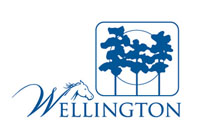The Village of Wellington has prepared a preliminary budget of $79 million for fiscal year 2015-16. That is about $2.1 million higher than the 2014-15 budget of $76.9 million. It includes major roadway, governmental facilities and surface water management projects.
Administrative & Financial Services Director Tanya Quickel noted that Wellington’s property values have increased 9.7 percent over the past year, which will help cover the increased budget.
“That shows an increase in the economy, so that’s a good thing,” Quickel told the Town-Crier on Wednesday. “The additional ad valorem tax revenue at the same millage rate… will yield an additional $1.4 million in ad valorem revenue.”
While the tax rate is slated to stay the same, the average homeowner will pay a bit a more.
“The bottom line is, if we stay at the 2.45 mills, a homeowner with a $200,000 house that is homesteaded will see a $4 increase in their ad valorem tax,” Quickel said. “If they are not a homesteaded property, they would see a $48 increase.”
The Acme Improvement District drainage assessment is proposed to remain the same at $230 per unit.
Two significant revenue decreases are projected in the budget. License and permit revenue is expected to drop by $660,000, and impact fees will decrease by about $500,000 due to the decrease in buildable property.
The proposed operating budget includes increases of $3.9 million for major maintenance programs and capital projects, with $626,400 for new equipment, including computers and software upgrades, utilities, tools and equipment, building maintenance vehicles and equipment; $457,000 in wage increases slated at 2.5 percent; $365,000 for water and wastewater operations; and $164,000 more for the law enforcement contract with the Palm Beach County Sheriff’s Office.
During a recent visioning workshop, Quickel conveyed a somewhat dire report based on an auditor’s review that the council and the village will face some tough decisions in coming years due to Wellington’s current habit of using reserve funds to cover budget increases.
On the positive side, she noted that there is a $20 decrease per home in the solid waste assessment.
“We did rebid that contract this year, so there were some important changes from that, so it worked out very well,” Quickel said. “The main focus in looking forward is knowing those changes and considering that some changes in service levels may be a factor.”
Capital projects in the budget that the council will consider include a roundabout at Pierson Road and Stribling Way and two sets of turn lanes on Big Blue Trace at Barberry Drive and Wilshire Village Drive.
The village now has an online survey on the front page of its web site at www.wellingtonfl.gov called the Budget Challenge, which launched Wednesday. It invites residents to provide their input.
“We go over a series of questions and ask for input on various areas regarding the budget, and things they would like to emphasize,” Quickel said. “We’ll have another workshop on capital projects in the upcoming weeks. We’re trying to get that scheduled now. The council has seen that preliminary information, and that’s where we start.”
During the visioning workshop, she pointed out that this year, more than $900,000 in rate stabilization and unrestricted funds were used to balance the budget, and that about $800,000 more, and about $1.3 million in Acme fund reserves, are being looked at to balance the 2016 budget.
In order to sustain services, she said the shortfall would continue to grow with the current 2.45 millage rate, which equates to $2.45 per $1,000 in assessed property value.
“We will continue to use more and more fund reserves from both the general fund and Acme,” she explained, adding that current gas tax revenue will not cover planned road maintenance.
For 2016, Quickel said that $1.74 million in reserves may be needed to offset the shortfall, and the recreation impact fees will not fully finance debt service requirements. The village would have to use $653,000 in 2016 to offset the shortfall in recreation impact fees.
Even with the current 9.7 percent increase in total property value, she said, at the current millage rate, general fund reserves would fall below the recommended 25 percent in 2019.








